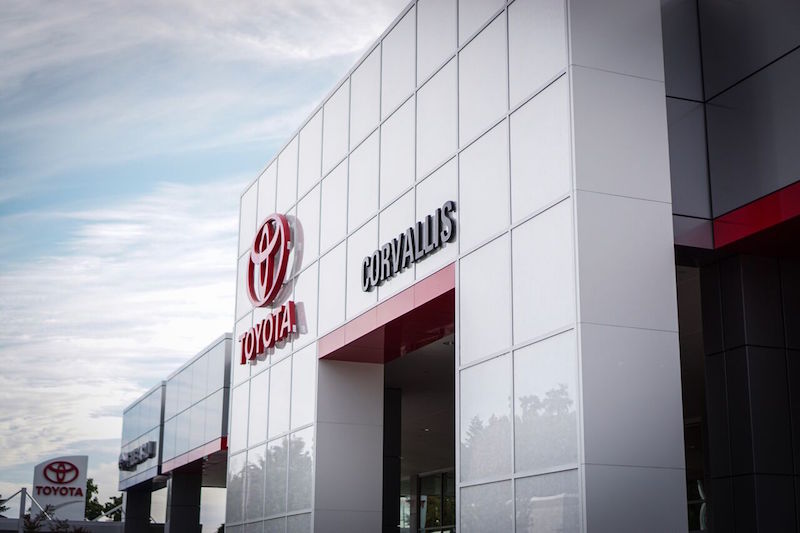Through its use of photovoltaic panels, water harvesting to irrigate the landscape, radiant floor heating, and geothermal heating and cooling, Toyota of Corvallis, in Corvallis, Ore., is looking to become the first net zero energy auto dealership in the world.
A net zero building is one that, at the end of the year, produced more energy than it used. Any excess energy that is harvested is returned directly to the local power grid to help offset local power demands at peak usage periods.
Gensler, the architect of the 34,8000-sf Corvallis facility, will monitor the building and collect data for the next 14 months to ensure the dealership reaches the lofty goal it has set its sights on. In addition to looking to become a certified net zero energy building, the dealership was constructed to adhere to LEED Platinum standards. There are already a few Toyota dealerships around the country with this certification.
The ribbon cutting ceremony for the building occurred in late September and was attended by representatives from both Toyota and Gensler.
"As a design firm committed to constantly raising the bar and leading the charge on the future of sustainable design projects, we are very proud of this project,” says Rick Ferrara, Project Director, Gensler, in a press release. “Not only is Toyota of Corvallis setting a new standard for Toyota, they are leading the industry in a completely new direction."
Related Stories
| Aug 11, 2010
29 Great Solutions for the AEC Industry
AEC firms are hotbeds of invention and innovation to meet client needs in today's highly competitive environment. The editors of Building Design+Construction are pleased to present 29 "Great Solutions" to some of the most complex problems and issues facing Building Teams today. Our solutions cover eight key areas: Design, BIM + IT, Collaboration, Healthcare, Products, Technology, Business Management, and Green Building.
| Aug 11, 2010
Walmart establishes sustainable product index to evaluate 'greeness' of products
Walmart today announced plans to develop a worldwide sustainable product index during a meeting with 1,500 of its suppliers, associates and sustainability leaders at its home office. The index will establish a single source of data for evaluating the sustainability of products.
| Aug 11, 2010
9 rooftop photovoltaic installation tips
The popularity of rooftop photovoltaic (PV) panels has exploded during the past decade as Building Teams look to maximize building energy efficiency, implement renewable energy measures, and achieve green building certification for their projects. However, installing rooftop PV systems—rack-mounted, roof-bearing, or fully integrated systems—requires careful consideration to avoid damaging the roof system.
| Aug 11, 2010
USGBC’s Greenbuild 2009 brings global ideas to local main streets
Save the planet with indigenous knowledge. Make permanent water part of your life. Dive deep water for clues to environmental success. Connect site selection to successful creative concepting. Explore the unknown with Discovery Channel’s best known guide. These are but a few of the big ideas participants can connect to at USGBC’s Greenbuild International Conference and Expo, taking place on November 11-13, 2009 in Phoenix, Ariz.
| Aug 11, 2010
Toronto mandates green roofs
The city of Toronto late last month passed a new green roof by-law that consists of a green roof construction standard and a mandatory requirement for green roofs on all classes of new buildings. The by-law requires up to 50% green roof coverage on multi-unit residential dwellings over six stories, schools, nonprofit housing, and commercial and industrial buildings.
| Aug 11, 2010
Great Solutions: Products
14. Mod Pod A Nod to Flex Biz Designed by the British firm Tate + Hindle, the OfficePOD is a flexible office space that can be installed, well, just about anywhere, indoors or out. The self-contained modular units measure about seven feet square and are designed to serve as dedicated space for employees who work from home or other remote locations.







